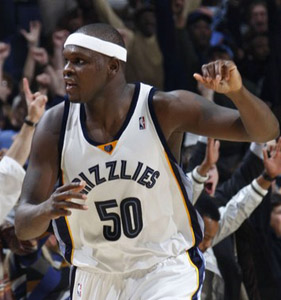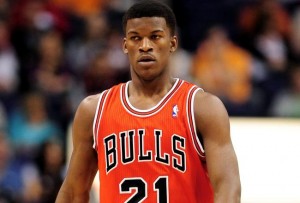Two days. Two banked-in buzzer-beaters. That’s about as crazy as it gets. And then you realize that all four favorites are down 2-1 in this second round. The next week or so is going to be good. Get ready.
Some of these early-series results haven’t been entirely unexpected: the Cavs’ floor-spacing takes a huge hit without Kevin Love, the Hawks looked unconvincing in getting by the Nets, and the Clippers just look like a team of destiny right now.
But while pretty much everyone expected the Grizzlies to give the Warriors a real test, winning two out of the first three? I know I didn’t see that coming. And I’m as big a fan of the grit and grind as anyone out there.
 Here’s what Grantland’s Zach Lowe yesterday said the Grizz had to do to slow the Warriors:
Here’s what Grantland’s Zach Lowe yesterday said the Grizz had to do to slow the Warriors:
A basic reality: I still don’t think the Grizz have an answer for Stephen Curry pick-and-rolls that involve Zach Randolph defending the screener. Randolph has to leap out in case of a Curry 3-pointer, and he’s just not quick enough to prevent Curry from turning the corner or recover onto Draymond Green as Green rolls free to the basket.
Golden State became undisciplined in Game 2. The wrong players took the wrong shots early in the shot clock, and when the Grizz defense contained the first Curry pick-and-roll, the Warriors moved on to something else instead of running poor Z-Bo right back into another one. They weren’t cruel enough.
Memphis gets that, which is why it was interesting to see Dave Joerger switch Marc Gasol onto Green during the fourth quarter of Game 2. Gasol’s no faster than Randolph, but he’s bigger and a little more balanced scurrying around far from the hoop. Joerger has also experimented1 with Jeff Green on Draymond Green, an attempt to inject a speedier player capable of switching onto Curry.
You can’t hide in the playoffs. Golden State can simply find Randolph’s guy and have him screen for Curry. But if that guy is Andrew Bogut, the Dubs lose a little bit of playmaking. If it’s Harrison Barnes or Andre Iguodala, the level of outside shooting around the central action isn’t quite as lethal. Mike Conley can do a credible job on Curry, which means Tony Allen can focus on his Revis Island job against Klay Thompson.
Toss it all together and you can see Memphis manipulating the matchups just enough to chip away at Golden State’s beautiful scoring machine.
Memphis held the Dubs to just 89 points today. If they’ve got something figured out, they could be headed back to the West finals. And then, who knows? The Rockets and Clippers look great right now, but hardly unbeatable in the vein of the Spurs and Thunder of the last few years.
The chief architect of Memphis’ grit and grind ethos is First-Team Tony Allen. ESPN.com’s Michael Wallace has a profile on Allen up now, and I liked this interesting explanation for why Allen wandered through a youth dance team performance in Game 1:
Allen has developed an intricate process for each specific showdown. After arriving in Memphis, he was dissatisfied with getting paper copies of scouting reports and demanded a computer-based setup similar to how the Celtics worked under coach Doc Rivers. The Grizzlies now have computer tablets in each locker stall.
“I’d grab our video equipment guy and say, ‘Who I got tomorrow?’” Allen said of looming defensive matchups. “I’d tell him I wanted all of their offensive sets, and I want you to give me their three previous games. I want to see their isolation situations. I want to see every time they caught it in a set when he was aggressive, every time he got it in transition. I would break that down. I study and eat all that up.”
Allen developed a knack for anticipating play calls before the opposing team’s own players know the play.
“So when the play is coming, I’ll say in my head, ‘Let me jump to his right hand, because when they call that, I saw on film he went right and then split the pick-and-roll. My mind works like that in the game — in a split second. A light goes off like, ‘OK, I know this play, cool.’ When the pick comes, I’ll just need a little help. And then once I catch back up in front of him, I tell my big fella to get back. Now, we’re back to one-on-one. And the only way you’re going to beat me now is by having a jetpack on your back or something so you can jump clean over me. But it’s one-on-one defense now. So let’s get at it.”
These are the voices and schemes running through Allen’s head during games. Sometimes, it causes him to drift off into his own world during timeouts. He wanders along the bench or strays back onto the court. In Game 1 against the Warriors, this was the reason he strolled aimlessly into the middle of a youth dance group’s performance on the court during a break in play at Oracle Arena.
By the time Allen realized what he had done, he was already the biggest villain in the series and was booed mercilessly by Warriors fans through the first two games at Golden State.
“Once I snapped back, I was like, ‘Aw, man,’” Allen said. “I apologized to those kids, man.”
There’s four teams still alive that don’t play in the Western Conference, though, and one with a ton of momentum right now is the Chicago  Bulls. Leading the way for them is RFA-to-be Jimmy Butler, the subject of this piece from USA Today’s Jeff Zillgitt:
Bulls. Leading the way for them is RFA-to-be Jimmy Butler, the subject of this piece from USA Today’s Jeff Zillgitt:
Already a dedicated basketball player, Butler focused on his offense last summer, pulling the plug on cable and the internet. It was practically eat, basketball, sleep, basketball, repeat. Maybe the occasional movie and back to basketball.
“It started early in the summer,” Butler told USA TODAY Sports. “We were in the gym all the time. We shoot jumpers. We work on my ballhandling, mid-post a majority of the time. Your confidence really does come from your work. As long as I kept seeing the ball go in the basket, my confidence continued to grow.”
The work translated into results: Butler averaged the same amount of minutes this season as he did last season (38.7) but increased his scoring from 13.1 points to 20, boosted his shooting percentage from 39.7% to 46.2% and his three-point shooting from 28.3% to 37.8%. His free throwing shooting percentage moved up 6½ percentage points to 83.4%.
“When you get to watch him play, you realize and recognize how special he is,” Thibodeau says. “It hasn’t happened by accident. The way he’s worked, it’s a testament to his character and who he is as a person. Obviously, to get where he is today, you have to have a lot of talent, which he does have. But when you combine that with his intelligence, his drive, then you get something special.
“I don’t want to put a lid on it. I don’t think any of us do. We don’t know where it’s going. All I know is if you study his career, every year he has gotten a lot better.”